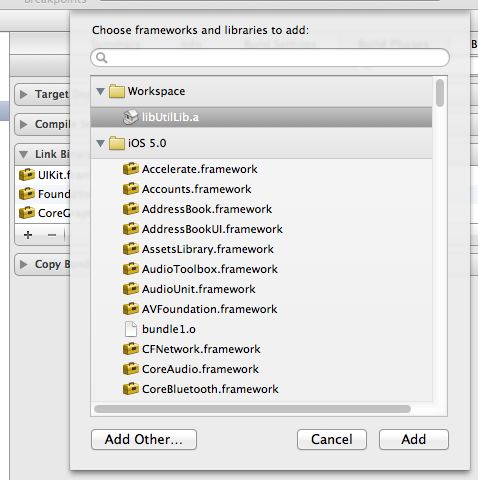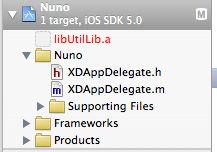xcode4的环境变量,Build Settings参数,workspace及联编设置
一、xcode4中的环境变量
$(BUILT_PRODUCTS_DIR)
build成功后的,最终产品路径--可以在Build Settings参数的Per-configuration Build Products Path项里设置
$(TARGET_NAME)
目标工程名称
$(SRCROOT)
工程文件(比如Nuno.xcodeproj)的路径
$(CURRENT_PROJECT_VERSION)
当前工程版本号
其他:
当编译静态库,设备选模拟器(iPhone 5.0 Simulator),未设置任何Build Settings参数时,默认的基础路径:
/Users/xxx/Library/Developer/Xcode/DerivedData/xxxWorkspace-caepeadwrerdcrftijaolkkagbjf
下面用$()代替上面一长串东东
$(SYMROOT) = $()/Build/Products
$(BUILD_DIR) = $()/Build/Products
$(BUILD_ROOT) = $()/Build/Products
这三个变量中的$()不会随着Build Settings参数的设置而改变
相反,以下可以通过设置而改变
$(CONFIGURATION_BUILD_DIR) = $()/Build/Products/Debug-iphonesimulator
$(BUILT_PRODUCTS_DIR) = $()/Build/Products/Debug-iphonesimulator
$(CONFIGURATION_TEMP_DIR) = $()/Build/Intermediates/UtilLib.build/Debug-iphonesimulator
$(TARGET_BUILD_DIR) = $()/Build/Products/Debug-iphonesimulator
$(SDK_NAME) = iphonesimulator5.0
$(PLATFORM_NAME) = iphonesimulator
$(CONFIGURATION) = Debug
$(TARGET_NAME) = UtilLib
$(EXECUTABLE_NAME) = libUtilLib.a 可执行文件名
${IPHONEOS_DEPLOYMENT_TARGET} 5.0
$(ACTION) = build
$(CURRENTCONFIG_SIMULATOR_DIR) 当前模拟器路径
$(CURRENTCONFIG_DEVICE_DIR) 当前设备路径
$(BUILD_DIR)/$(CONFIGURATION)$(EFFECTIVE_PLATFORM_NAME =
$()/Build/Products/Debug-iphonesimulator
$(PROJECT_TEMP_DIR)/$(CONFIGURATION)$(EFFECTIVE_PLATFORM_NAME) = $()/Build/Intermediates/UtilLib.build/Debug-iphonesimulator
自定义变量
${CONFIGURATION}-iphoneos 表示:Debug-iphoneos
${CONFIGURATION}-iphonesimulator 表示:Debug-iphonesimulator
$(CURRENTCONFIG_DEVICE_DIR) = ${SYMROOT}/${CONFIGURATION}-iphoneos
$(CURRENTCONFIG_SIMULATOR_DIR) = ${SYMROOT}/${CONFIGURATION}-iphonesimulator
自定义一个设备无关的路径(用来存放各种架构arm6/arm7/i386输出的产品)
$(CREATING_UNIVERSAL_DIR) = ${SYMROOT}/${CONFIGURATION}-universal
自定义变量代表的值
$(CURRENTCONFIG_DEVICE_DIR) = $()/Build/Products/Debug-iphoneos
$(CURRENTCONFIG_SIMULATOR_DIR) = $()/Build/Products/Debug-iphonesimulator
$(CREATING_UNIVERSAL_DIR) = $()/Build/Products/Debug-universal
iphoneos5.0下的编译脚本:
xcodebuild -project "UtilLib.xcodeproj" -configuration "Debug" -target "UtilLib" -sdk "iphoneos5.0" -arch "armv6 armv7" build RUN_CLANG_STATIC_ANALYZER=NO $(BUILD_DIR)="${BUILD_DIR}" BUILD_ROOT="${BUILD_ROOT}"
iphonesimulator5.0下的编译脚本:
xcodebuild -project "UtilLib.xcodeproj" -configuration "Debug" -target "UtilLib" -sdk "iphonesimulator5.0" -arch "i386" build RUN_CLANG_STATIC_ANALYZER=NO $(BUILD_DIR)="${BUILD_DIR}" BUILD_ROOT="${BUILD_ROOT}"
加上下面一句表示输出到文件:
> "${BUILD_ROOT}.build_output"
lipo脚本工具:合并iPhone模拟器和真机的静态类库,生成通用库
lipo -create -output "${CREATING_UNIVERSAL_DIR}/${EXECUTABLE_NAME}" "${CURRENTCONFIG_DEVICE_DIR}/${EXECUTABLE_NAME}" "${CURRENTCONFIG_SIMULATOR_DIR}/${EXECUTABLE_NAME}"
意思是:把"${CURRENTCONFIG_DEVICE_DIR}目录下的.a文件,和${CURRENTCONFIG_SIMULATOR_DIR}目录下的.a文件合并,
在${CREATING_UNIVERSAL_DIR}目录下,生成两个设备都通用的静态库,
例如:lipo -create -output xy.a x.a y.a
二、xcode4中build Settings常见参数解析
1.Installation Directory:安装路径
静态库编译时,在Build Settings中Installation Directory设置“$(BUILT_PRODUCTS_DIR)”
Skip Install设为YES
Installation Directory默认为/usr/local/lib
因为Build Location默认时,.a文件会放在很长(比如:/Users/xxx/Library/Developer/Xcode/DerivedData/xxxProgram
dalrvzehhtesxdfqhxixzafvddwe/Build/Products/Debug-iPhoneos)的路径下,或是我们target指定的路径
Skip Install如果是NO,可能会被安装到默认路径/usr/local/lib
2.Public Headers Folder Path:对外公开头文件路径
设为“include”(具体的头文件路径为:$(BUILT_PRODUCTS_DIR)/include/xx.h)
在最终文件.a同级目录下生成一个include目录
默认:/usr/local/include
Public Headers Folder Path这个路径就是使用这lib的某工程需要依赖的外部头文件.导入这路径后,#include/import "xx.h"才能看到
3.User Header Search Paths:依赖的外部头文件搜索路径
设置为“$(BUILT_PRODUCTS_DIR)/include”
和2中路径对应
4.Per-configuration Build Products Path:最终文件路径
比如设为“../app”,就会在工程文件.xcodeproj上一层目录下的app目录里,创建最终文件
默认为$(BUILD_DIR)/$(CONFIGURATION)$(EFFECTIVE_PLATFORM_NAME)
等于$(BUILT_PRODUCTS_DIR)
5.Per-configuration Intermediate Build Files Path:临时中间文件路径
默认为:$(PROJECT_TEMP_DIR)/$(CONFIGURATION)$(EFFECTIVE_PLATFORM_NAME)
6.Code Signing Identity:真机调试的证书选择
选一个和Bundle identifier相对应的证书
Library Search Paths:库搜索路径
Architectures:架构,设为 armv6 或 armv7
Valid Architectures:应用框架,可以设为 armv6、 armv7 或i386
Product Name:工程文件名,默认为$(TARGET_NAME)
Info.plist File:info文件路径
Build Variants:默认为normal
Other Linker Flags:其他链接标签
设为“-ObjC”
当导入的静态库使用了类别,需要设为-ObjC
iOS Deployment Target:ios部署对象
比如可以选择设为,ios3到ios5的一种版本
Prefix Header:预编头文件(比如:UtilLib/UtilLib-Prefix.pch)
Precompile Prefix Header:设为“Yes”,表示允许加入预编译头
三、workspace(工作区)
作用:管理多个工程(project),多工程联编
四、workspace多工程联编设置
一、
1.新建一个静态库工程,比如UtilLib,并生成UtilLib.h和UtilLib.m文件
2.选中需要公开的头文件,
把右侧栏的Target Membership中设置为public
或则,选中工程目录target的Build Phases标签的copy headers项,在public中添加要公开的头文件
3.Architectures设为:armv6 armv7
4.Valid Architectures设为:armv6 armv7 i386
5.Build Products Path设为:$(SRCROOT)/../build
6.Per-configuration Build Products Path设为:
$(SRCROOT)/../build/$(CONFIGURATION)$(EFFECTIVE_PLATFORM_NAME)
7.Per-configuration Intermediate Build Files Path设为:
$(SRCROOT)/../build/$(TARGET_NAME).build/$(CONFIGURATION)$(EFFECTIVE_PLATFORM_NAME)
8.设置安装路径:Installation Directory项
9.设置对外公开的头文件路径:Public Headers Folder Path项
10.为静态库添加依赖的shell脚本
选中工程目录target的Build Phases标签,点击由下角的Add Build Phase按钮
在弹出的菜单里选择Add run script项,然后页面中会多出一个Run Script项
在黑框里填写"$SRCROOT/mergeArmSymbols.sh"
建立对此脚本的依赖(编译静态库的后会运行此脚本)
如果编译时设备选的是iphone simulator:
则此脚本会在对应iphone device的产品目录Debug-iphoneos中,生成对device有用的.a静态库,
相反,如果设备选的是iphone device:
则此脚本会在对应iphone simulator的产品目录Debug-iphoneos中,生成对simulator有用的.a静态库
最后,此脚本调用lipo工具,把本工程生成静态库与此脚本生成的静态库合并,生成simulator和device都通用的.a文件
11.具体bash shell脚本如下:
1 # Version 2.0 (updated for Xcode 4, with some fixes)
2
3 # Author: Adam Martin - http://twitter.com/redglassesapps
4 # Based on: original script from Eonil (main changes: Eonil's script WILL NOT WORK in Xcode GUI - it WILL CRASH YOUR COMPUTER)
5 #
6 # More info: see this Stack Overflow question: http://stackoverflow.com/questions/3520977/build-fat-static-library-device-simulator-using-xcode-and-sdk-4
7
8 #################[ Tests: helps workaround any future bugs in Xcode ]########
9 #
10 DEBUG_THIS_SCRIPT="true"
11
12 if [ $DEBUG_THIS_SCRIPT = "true" ]
13 then
14 echo "########### TESTS #############"
15 echo "Use the following variables when debugging this script; note that they may change on recursions"
16 echo "BUILD_DIR = $BUILD_DIR"
17 echo "BUILD_ROOT = $BUILD_ROOT"
18 echo "CONFIGURATION_BUILD_DIR = $CONFIGURATION_BUILD_DIR"
19 echo "BUILT_PRODUCTS_DIR = $BUILT_PRODUCTS_DIR"
20 echo "CONFIGURATION_TEMP_DIR = $CONFIGURATION_TEMP_DIR"
21 echo "TARGET_BUILD_DIR = $TARGET_BUILD_DIR"
22 echo "SDK_NAME = $SDK_NAME"
23 echo "PLATFORM_NAME = $PLATFORM_NAME"
24 echo "CONFIGURATION = $CONFIGURATION"
25 echo "TARGET_NAME = $TARGET_NAME"
26 echo "ARCH_TO_BUILD = $ARCH_TO_BUILD"
27 echo "ARCH_TO_BUILD = $ARCH_TO_BUILD"
28 echo "ACTION = $ACTION"
29 echo "SYMROOT = $SYMROOT"
30 echo "EXECUTABLE_NAME = $EXECUTABLE_NAME"
31 echo "CURRENTCONFIG_SIMULATOR_DIR = $CURRENTCONFIG_SIMULATOR_DIR"
32 echo "CURRENTCONFIG_DEVICE_DIR = $CURRENTCONFIG_DEVICE_DIR"
33
34 echo "#############Other###########"
35 echo "BUILD_DIR/CONFIGURATION/EFFECTIVE_PLATFORM_NAME = $BUILD_DIR/$CONFIGURATION$EFFECTIVE_PLATFORM_NAME"
36
37 echo "PROJECT_TEMP_DIR/CONFIGURATION/EFFECTIVE_PLATFORM_NAME = $PROJECT_TEMP_DIR/$CONFIGURATION$EFFECTIVE_PLATFORM_NAME"
38
39 fi
40
41 #####################[ part 1 ]##################
42 # First, work out the BASESDK version number
43 # (incidental: searching for substrings in sh is a nightmare! Sob)
44
45 SDK_VERSION=$(echo ${SDK_NAME} | grep -o '.\{3\}$')
46
47 # Next, work out if we're in SIM or DEVICE
48
49 if [ ${PLATFORM_NAME} = "iphonesimulator" ]
50 then
51 OTHER_SDK_TO_BUILD=iphoneos${SDK_VERSION}
52 ARCH_TO_BUILD="armv6 armv7"
53 else
54 OTHER_SDK_TO_BUILD=iphonesimulator${SDK_VERSION}
55 ARCH_TO_BUILD="i386"
56 fi
57
58 echo "XCode has selected SDK: ${PLATFORM_NAME} with version: ${SDK_VERSION} (although back-targetting: ${IPHONEOS_DEPLOYMENT_TARGET})"
59 echo "...therefore, OTHER_SDK_TO_BUILD = ${OTHER_SDK_TO_BUILD}"
60 #
61 #####################[ end of part 1 ]##################
62
63 #####################[ part 2 ]##################
64 #
65 # IF this is the original invocation, invoke whatever other builds are required
66 #
67 # Xcode is already building ONE target... build ONLY the missing platforms/configurations.
68
69 if [ "true" == ${ALREADYINVOKED:-false} ]
70 then
71 echo "RECURSION: Not the root invocation, don't recurse"
72 else
73 # Prevent recursion
74 export ALREADYINVOKED="true"
75
76 echo "RECURSION: I am the root... recursing all missing build targets..."
77 echo "RECURSION: ...about to invoke: xcodebuild -configuration \"${CONFIGURATION}\" -target \"${TARGET_NAME}\" -sdk \"${OTHER_SDK_TO_BUILD}\" -arch \"${ARCH_TO_BUILD}\" ${ACTION} RUN_CLANG_STATIC_ANALYZER=NO"
78 xcodebuild -project "${TARGET_NAME}.xcodeproj" -configuration "${CONFIGURATION}" -target "${TARGET_NAME}" -sdk "${OTHER_SDK_TO_BUILD}" -arch "${ARCH_TO_BUILD}" ${ACTION} RUN_CLANG_STATIC_ANALYZER=NO BUILD_DIR="${BUILD_DIR}" BUILD_ROOT="${BUILD_ROOT}" > "${BUILD_ROOT}.build_output"
79 ACTION="build"
80
81 # Merge all platform binaries as a fat binary for each configurations.
82
83 # Calculate where the (multiple) built files are coming from:
84 CURRENTCONFIG_DEVICE_DIR=${SRCROOT}/../build/${CONFIGURATION}-iphoneos
85 CURRENTCONFIG_SIMULATOR_DIR=${SRCROOT}/../build/${CONFIGURATION}-iphonesimulator
86
87 echo "Taking device build from: ${CURRENTCONFIG_DEVICE_DIR}"
88 echo "Taking simulator build from: ${CURRENTCONFIG_SIMULATOR_DIR}"
89
90 CREATING_UNIVERSAL_DIR=${SRCROOT}/../build/${CONFIGURATION}-universal
91 echo "...outputing a universal arm6/arm7/i386 build to: ${CREATING_UNIVERSAL_DIR}"
92
93 # ... remove the products of previous runs of this script
94 # NB: this directory is only created by this script - it should be safe to delete
95
96 rm -rf "${CREATING_UNIVERSAL_DIR}"
97 mkdir "${CREATING_UNIVERSAL_DIR}"
98
99 #
100 echo "lipo: for current configuration (${CONFIGURATION}) creating output file: ${CREATING_UNIVERSAL_DIR}/${EXECUTABLE_NAME}"
101 lipo -create -output "${CREATING_UNIVERSAL_DIR}/${EXECUTABLE_NAME}" "${CURRENTCONFIG_DEVICE_DIR}/${EXECUTABLE_NAME}" "${CURRENTCONFIG_SIMULATOR_DIR}/${EXECUTABLE_NAME}"
102
103 #######custom########
104 #copy universal lib to ../libs
105 libsDir=../libs
106 includeDir=../include
107
108 rm -rf "${libsDir}"
109 mkdir -p "${libsDir}"
110
111 echo "cp -R ${CREATING_UNIVERSAL_DIR}/${EXECUTABLE_NAME} ${libsDir}"
112
113 cp -R "${CREATING_UNIVERSAL_DIR}/${EXECUTABLE_NAME}" "${libsDir}"
114
115 echo "cp -R ${CURRENTCONFIG_DEVICE_DIR}/include ${includeDir}"
116
117 cp -R "${CURRENTCONFIG_DEVICE_DIR}/include" "${includeDir}"
118
119 fi
下载右边的图片,然后把后缀改为.sh(其实就是上面的脚本,因为博客园只能上传图片)
静态库编译后的目录结构如下:
二、
1.新建主工程,比如Nuno,添加对静态库的依赖
点击工程,在Build Phases标签的Link Binary With Libraries项中点击加号添加UtilLib.a库
选中上面的红色项,在右边栏的Location选Relative to Project,把值设为../libs/libUtilLib.a
2.设置主工程依赖的外部头文件路径:User Header Search Paths项
$(SRCROOT)/../include
3.设置Header Search Paths为:$(SRCROOT)/../include
4.设置Library Search Paths为:$(SRCROOT)/../libs
编译运行即可实现联编
(备注:选择模拟器iphone 5.0 simulator,编译静态库的时,最终文件会在Debug-iphonesimulator,就算成功.a文件还是红色,
这是可能是xcode的bug,不会自动切换路径
因为$(BUILT_PRODUCTS_DIR)所指的位置,是build/Debug-iphonesos,不是包含最终.a文件的Debug-iphonesimulator;
选择ios Device,编译成的最终文件才在build/Debug-iphonesos下,.a文件变成非红色
所有得用mergeArmSymbols.sh脚本来解决)












